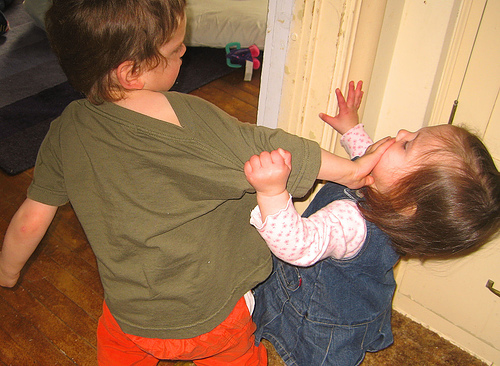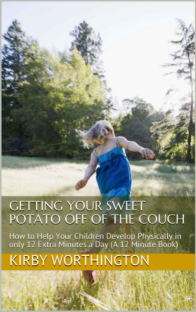Dealing with Bickering
 Few things can grate on a mom's nerves like constant fighting. You want your kids to be best friends with each other, to play well together, and to love each other, but you may be at a loss as to how to deal with the inevitable bickering.
Few things can grate on a mom's nerves like constant fighting. You want your kids to be best friends with each other, to play well together, and to love each other, but you may be at a loss as to how to deal with the inevitable bickering.
The first step to dealing with a fight is to help your kids calm down. When emotions are running high, kids are not capable of problem solving. You may need to separate the children, not as a punishment, but as a break to help each one regain some equilibrium. Do you know what calms your children down? Is it being alone or cuddling with you? Do they feel better when they sit down with a book or doll or when they listen to music? Does it help them to have a comfort item? If you ask your children to take a break in their rooms, tell them what they can do ("You may sit in your beanbag and talk to your doll," or "You may play with your legos.")
When the emotions have settled, talk to each child individually about what happened. Have them put their feelings and the events into words, and help them notice what upset them. Reflect and affirm their emotions. ("That must have been really frustrating when your little brother knocked down the tower you worked so hard on.")
Next, problem solve together. Point out what happened ("You got angry and you hit your brother"), and communicate boundaries ("It's not ok to hit. Hitting hurts.") Then ask questions like "What could you do instead of hitting?" or "What can you do when you're angry?" Help them come up with acceptable ways to handle their feelings.
Role play your solutions. You can be silly and laugh a lot doing this, but make sure they get some practice with helpful ways to handle arguments.
You might need to do some problem solving on your own too. Are circumstances contributing to the bickering? If fighting is happening often in the car, do you need to pick a different time to do errands? Can you be proactive about positive activities for car trips, like playing "I Spy," singing together, or bringing along toys or books? Do arguments break out right before meals or naps? Can you plan activities to keep things calm when your kids are tired or hungry? Right before dinner could be quiet reading time or play-by-yourself time. This problem solving doesn't need to be discussed with the kids, but it can help you prevent future problems.
Dealing with sibling fighting can be frustrating, but when handled well, it can be a great opportunity for teaching empathy, problem-solving skills, and emotion management—and these skills will serve them for a lifetime.
Photo Credit: Sharon Mollerus cc
Related Posts
By accepting you will be accessing a service provided by a third-party external to https://growthandgiggles.com/

